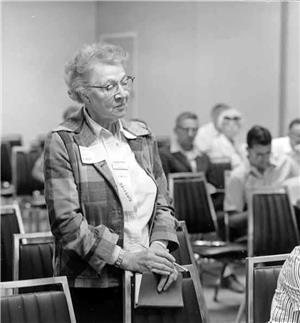Hazel Wolf (1898-2000), a quintessential activist, championed many causes in her 101 years. First an advocate of women's rights, she went on to support labor and environmental issues. She was a member of the Communist party long before it was illegal, and suffered the ire of McCarthy-era red-baiting in the 1950s. Hazel recalled these difficult times in a 1999 speech, transcribed in part below. (Note: Hazel Wolf died on January 19, 2000.)
Hysteria
"It was during the hysteria of the McCarthy period in the '50s that I had a run-in with the law. I was arrested for earlier membership in the Communist Party and held for deportation to Canada. As you know, deportation proceedings are held under civil, not criminal, laws.
"The INS [Immigration and Naturalization Service] thought nothing of trying to deport me, who was foreign born, for membership in the Communist Party 13 years before my arrest, when membership was not a deportable offense. I can only charitably assume that the illiterate INS didn't know what the phrase ex poste facto meant. I have good reasons to believe that were it not for pro bono lawyers, I would not be here today, but would have spent the last 40 years in exile in England, although I was born only 80 miles from Seattle.
"We had friends in the Canadian parliament whom we persuaded to ask their government not to accept me. So, after 10 years of trying, the United States was back to square one.
To England, Or Not
"Next, they tried to exile me to England, where I would spend the rest of my life. Behind every deportation lies such a tragedy. Shakespeare's Romeo poignantly described exile. He said: '. . .be merciful, say "death," do not say banishment.' I agree with Romeo. It would be a bad trip.
"Of course, I had no connection in England. But the INS made the mistake of lying to the British government, claiming I had no ties in the United States, that I had one daughter from whom I was estranged; in fact, that I didn't even know where she was.
"Eventually, by a question in the English parliament by a member to whom my lawyers had given the facts, England, too, refused to accept me. Spared once again from exile, this time we finally got some relief from the U.S. courts: the Ninth Circuit sent me back to the administrative level.
Other Deportees
"This time, the INS finally stopped their efforts to deport me. They had had enough of the Wolf case. The some 400 political deportations initiated by the INS were but a prelude to the McCarthy Cold War persecutions of the '50s, that deeply penetrated into every niche in our society: lawyers, the courts, the churches, labor unions, seamen, grass roots organizations such as senior citizens, the arts through attacking Paul Robeson and refusing to allow him to leave the country and refusing to allow English-born Charlie Chaplin and the artist Pablo Picasso to come in.
"Most of the deportees, however, were poor people, but due to the work of pro bono lawyers, only two were deported: Hamish McKay, expelled from his carpenter union in the USA because of his alleged Communism, was unable to find work here. However, Canada did not share the anti-Communist hysteria that prevailed in the United States. Hamish was fully employed in Vancouver, B.C., through his membership in the Canadian carpenters' union, where he and his family lived in comfort. Later, he was granted visitor's rights.
"William Mackey was sent to Finland and, after a few years when the hue and cry of McCarthyism died down, he was returned by Congressional action.
"My attorneys were John Caughlan, assisted by C. T. Hatten. They worried my case for fifteen years through innumerable administrative hearings and to the U.S. Supreme Court twice on certiorari.
"Along the route before the higher courts, local lawyers in the area usually acted on our behalf. John Caughlan, assisted by Barry Hatten, did the major work for all of the 14 deportees in Washington State.
"There was substantial help for the deportees by a grass roots organization known as the Washington Committee for the Protection of the Foreign Born. We raised funds to pay the attorneys' out-of-pocket expenses and a very small percentage of their services. Also, we carried on an educational campaign, which was very effective. Now that John has gone, we miss him very, very much. He was a fearless advocate for the civil rights of the foreign born. I am grieved to report that Maron Kinney, chairman of the Committee, died a just a few days ago. That leaves Barry Hatten and me the sole survivors of these grievous times.
"In summation, we lost most of the battles, but won the war in all of these cases.
After the Frenzy
"After some 24 years of turmoil, I finally became a citizen in 1974, at which time I forswore allegiance to Queen Elizabeth the Second. Celebrating at the local pub, I proposed the following toast: 'To hell with Queen Elizabeth .. and to hell with Richard Nixon, too.'
"There is a thin line between the people who suffer from civil rights abuse and the people of low income. Rich people seldom suffer civil rights abuse.
"Had it not been for pro bono lawyers, I would not be here today, but would be in England where I would spend the rest of my life, thousands of miles from my only child, my grandchildren, and not-yet-born great-grandchildren; from all my relatives and friends, completely uprooted from my home in this country where I have lived for almost 80 years."

